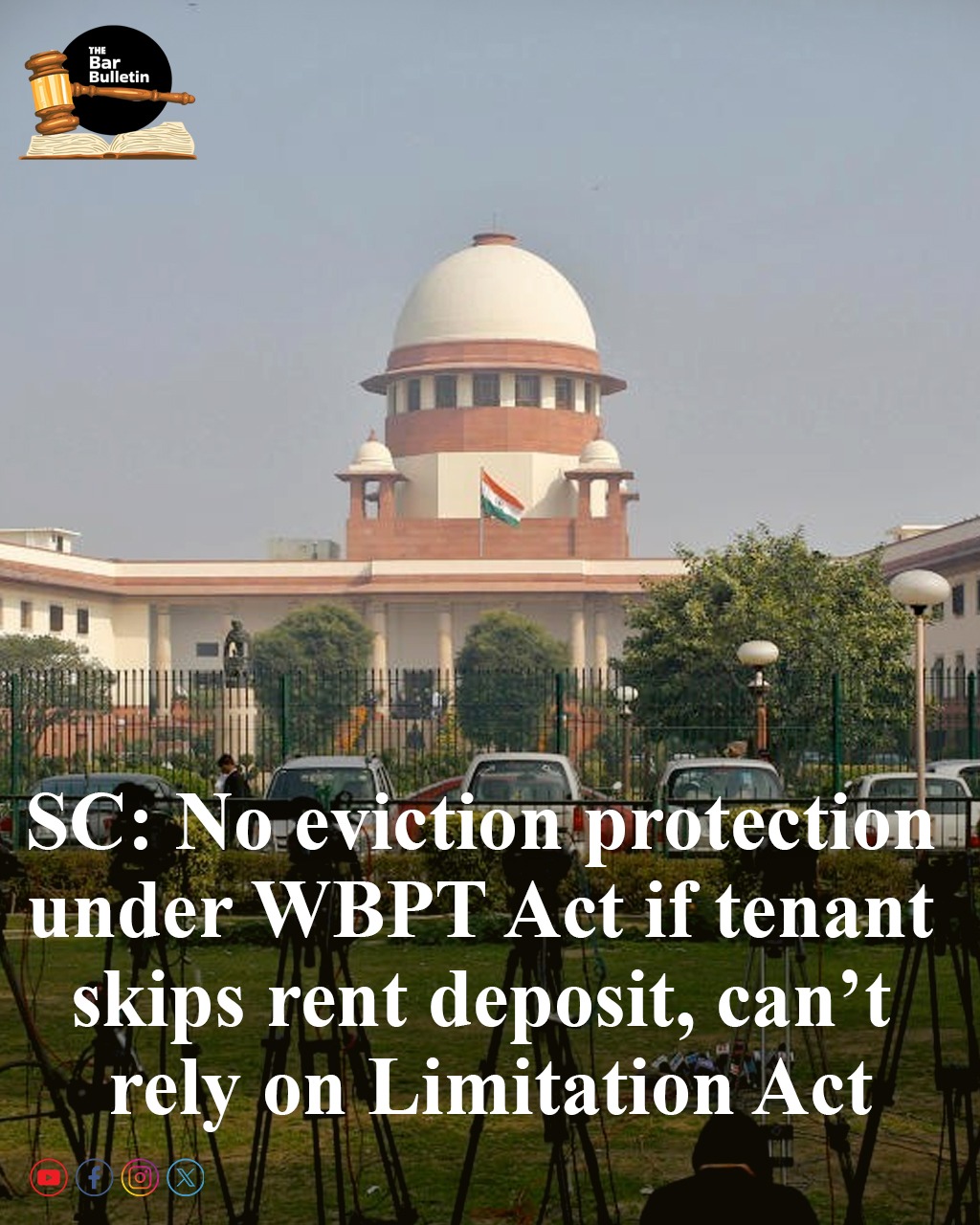The Supreme Court has ruled that a tenant must deposit the rent admitted by him to be due, along with an application for determination of rent payable, if he wants to avail the benefit of protection against eviction under the West Bengal Premises Tenancy Act, 1997 (WBPT Act), in cases of disputed rent. Since the tenant (appellant) had neither deposited nor paid the admitted rent and had only filed the application for determination of rent belatedly along with an application under Section 5 of the Limitation Act, 1963, the Apex Court fortified that the applications under Sections 7(1) and (2) of the WBPT Act by the tenant without deposit of rent after lapse of the statutory period of thirty days, was rightly not entertained by the Small Causes Court as well as the High Court.
Reference was made to Section 7 of the WBPT Act, which provides that in a suit for eviction filed by the landlord, the tenant shall pay to the landlord or deposit in the Court, all arrears of rent calculated at the rate at which it was last paid together with interest at the rate of 10% per annum. Further, the said deposit shall be made within one month from the date of service of the summons on the tenant or from the date of appearance in case the tenant appears without service of summons.
The Court also referred Section 7(4) of the WBPT Act to clarify that in a proceeding of eviction, no order for delivery of possession of the premises to the landlord shall be passed by the Court on the ground of default of payment if the tenant deposits the rent under sub-sections (1) or (2), but the Court may allow such cost to the landlord as deemed fit. However, if the tenant was allowed the relief but later makes default in payment of rent for four months within one year or in case of three successive rental periods, where the rent is not payable monthly, the relief of protection against eviction available u/s 7(4) cannot be allowed to the tenant.
The Division Bench comprising Justice J.K. Maheshwari and Justice Aravind Kumar observed that the provisions of the Limitation Act, 1963, would apply to the proceedings and appeals subject to the provisions of the WBPT Act relating to limitation. The Bench went ahead to observe that in case the tenant who is in occupation of premises defaults in payment of rent due to some inadvertence or fault, on ground of which the eviction is sought by the landlord, then on service of the summons, to prevent his defence from getting struck-off, the tenant must comply with the twin pre-requisites of Section 7 of the WBPT Act.
Briefly, the appellant, a tenant in the suit premises in Kolkata, belonging to the landlord (respondent), for a monthly rent of Rs. 1090, was faced with an ejectment suit on the grounds of arrears of rent, bona fide need, and sub-letting. On issuance of summons, the appellant filed applications under Sections 7(1) and 7(2) of the WBPT Act, along with an application under Section 5 of the Limitation Act, with the prayer to condone the delay of 17 days in applying the WBPT Act on the pretext of the Durga Puja vacations. This application, under the WBPT Act, enshrined the prayer for deposit of the ‘current rent’ for November 2022 at the rate of Rs. 1090 and for the determination of the default period, if any, and to refund the excess amount paid. The Small Causes Court rejected the said application, observing that 30 days as specified under the WBPT Act cannot be extended by the aid of Section 5 of the Limitation Act. The revision by the tenant before the High Court was also left in vain. Hence, the tenant knocked on the door of the Apex Court, but faced with similar fate due to non-compliance with Section 7(1) & 7(2) of the WBPT Act regarding the deposit of rent and applying within the same time.
Appearances:
Petitioner: Mr. Uday Gupta, Sr. Adv.; Mr. Hiren Dasan, AOR; Ms. Shivani Lal, Adv.; Mr. Harish Dasan, Adv.; Mr. Rajiv Ranjan, Adv.; Mr. Safdar Azam, Adv.; Mr. Ajay Sharma, Adv.; Mr. Unmukt Gera, Adv.; Mr. Mahendra Mali, Adv.; Mr. Deepanshu Rana, Adv.
Respondent(s) : Mr. Swarnendu Chatterjee, AOR;Mr. Amit Kumar Raidani, Adv.; Ms. Deepakshi Garg, Adv.; Ms. Harshita Rawat, Adv.



